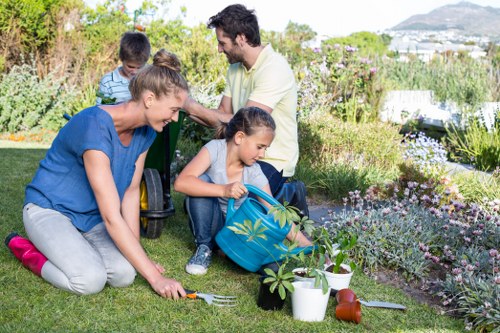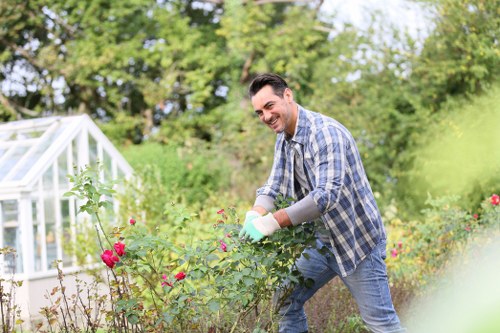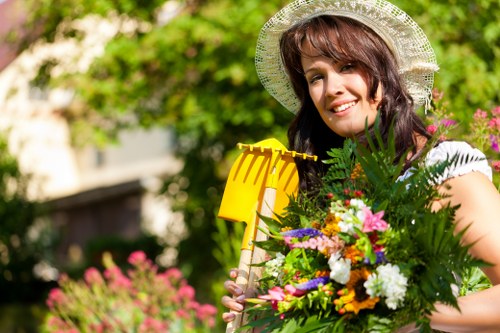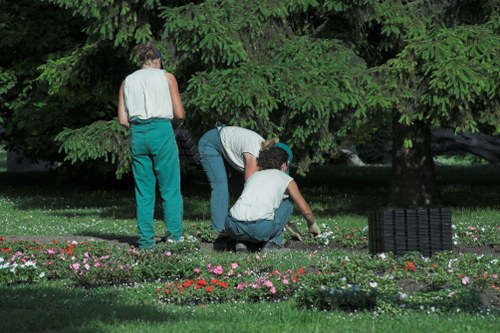Essential Guide to Garden Maintenance for Dedicated Gardeners

Maintaining a beautiful and thriving garden requires dedication, knowledge, and regular care. Whether you're a seasoned gardener or just starting out, understanding the fundamentals of garden maintenance is crucial for ensuring your plants flourish throughout the year.
Garden maintenance encompasses a variety of tasks, from pruning and weeding to soil management and pest control. Each activity plays a vital role in creating a healthy environment where plants can grow strong and vibrant.
In this comprehensive guide, we will explore the key aspects of garden maintenance, providing you with practical tips and strategies to keep your garden in top condition.

The Importance of Regular Garden Maintenance
Regular garden maintenance is essential for several reasons. It ensures that plants receive the necessary nutrients, helps prevent diseases, and maintains the overall aesthetics of your outdoor space.
Consistent care can also extend the lifespan of your plants, allowing them to reach their full potential. Moreover, a well-maintained garden can increase the value of your property and provide a serene environment for relaxation and enjoyment.
Neglecting garden maintenance, on the other hand, can lead to overgrown plants, increased susceptibility to pests, and a decline in plant health. Therefore, establishing a regular maintenance routine is key to sustaining a beautiful and productive garden.
- Enhances plant health and growth
- Prevents pest infestations and diseases
- Maintains garden aesthetics
- Increases property value
- Provides a relaxing outdoor space

Seasonal Garden Maintenance Tasks
Spring Maintenance
Spring is a critical time for garden maintenance as it marks the beginning of the growing season. Key tasks during this period include:
- Pruning: Remove dead or damaged branches to encourage healthy growth.
- Soil Preparation: Test and amend the soil to ensure it has the right nutrients and pH levels.
- Planting: Start planting new seeds and transplant young plants into your garden.

Summer Maintenance
Summer brings intense heat and longer days, necessitating specific maintenance practices:
- Watering: Ensure plants receive adequate water, especially during dry spells.
- Weeding: Regularly remove weeds to prevent them from competing with your plants for nutrients.
- Pest Control: Monitor for and manage pest infestations promptly.

Autumn Maintenance
As the growing season winds down, autumn is the time to prepare your garden for the colder months:
- Leaf Removal: Clear fallen leaves to prevent mold and disease.
- Composting: Turn garden waste into compost to enrich the soil for the next season.
- Plant Protection: Mulch and cover sensitive plants to protect them from frost.
Winter Maintenance
Winter requires minimal maintenance but still plays a role in garden health:
- Tool Care: Clean and store gardening tools properly to extend their lifespan.
- Planning: Plan and design your garden for the upcoming year.
- Indoor Gardening: Consider maintaining indoor plants to keep your green thumb active.

Essential Tools for Garden Maintenance
Having the right tools can significantly ease the process of garden maintenance. Here are some must-have tools for every gardener:
- Pruners: For trimming and shaping plants.
- Hand Trowel: Ideal for planting, weeding, and small digging tasks.
- Garden Fork: Useful for turning and aerating soil.
- Watering Can or Hose: Essential for providing moisture to your plants.
- Gloves: Protect your hands from thorns, dirt, and pests.
Investing in quality tools not only makes maintenance easier but also ensures better care for your garden.
Regularly maintaining your tools by cleaning and sharpening them will prolong their usefulness and efficiency.

Soil Care and Fertilization
Healthy soil is the foundation of a thriving garden. Proper soil care involves:
- Testing Soil: Determine nutrient levels and pH to understand your soil's needs.
- Amending Soil: Add organic matter, such as compost or manure, to improve soil structure and fertility.
- Mulching: Apply mulch to retain moisture, regulate soil temperature, and suppress weeds.
Fertilizing Your Garden
Fertilizers provide essential nutrients that plants need to grow. There are two main types of fertilizers:
- Organic Fertilizers: Derived from natural sources like compost, bone meal, and fish emulsion.
- Inorganic Fertilizers: Synthetic fertilizers that provide nutrients in a readily available form.
Choosing the right fertilizer depends on your garden's specific needs and the types of plants you are growing.

Pest and Disease Management
Protecting your garden from pests and diseases is crucial for maintaining plant health. Effective management strategies include:
- Regular Monitoring: Inspect plants frequently to catch issues early.
- Integrated Pest Management (IPM): Combine biological, cultural, physical, and chemical tools to manage pests sustainably.
- Natural Remedies: Use neem oil, insecticidal soap, or beneficial insects like ladybugs to control pests.
Preventative Measures
Prevention is often more effective than treatment. Implementing the following practices can reduce the risk of pest and disease problems:
- Proper Spacing: Ensure adequate air circulation between plants.
- Crop Rotation: Rotate plant families to prevent soil-borne diseases.
- Sanitation: Remove and dispose of diseased plant material promptly.

Pruning and Trimming Techniques
Pruning and trimming help shape plants, remove dead or diseased parts, and promote healthy growth. Key techniques include:
- Thinning: Remove entire branches to improve airflow and light penetration.
- Heading: Cut back the tips of branches to encourage bushier growth.
- Pinching: Remove the growing tips of young plants to control their shape and size.
When to Prune
The timing of pruning varies depending on the plant species. Generally:
- Flowering Plants: Prune after flowering to encourage new growth.
- Fruit Trees: Prune in late winter while trees are dormant.
- Shrubs and Hedges: Trim in early spring or late summer.
Proper pruning not only enhances the appearance of your garden but also contributes to plant health and productivity.

Efficient Watering Techniques
Watering is a critical aspect of garden maintenance. Implementing efficient watering techniques can save water and ensure your plants receive adequate moisture:
- Deep Watering: Water deeply to encourage deep root growth.
- Early Morning: Water in the early morning to reduce evaporation and prevent fungal diseases.
- Drip Irrigation: Use drip systems to deliver water directly to the plant roots, minimizing waste.
Water Conservation Tips
Conserving water not only benefits the environment but also your garden's health:
- Mulching: Retains soil moisture and reduces the need for frequent watering.
- Rainwater Harvesting: Collect and store rainwater for garden use.
- Drought-Resistant Plants: Choose plants that require less water.
Implementing these techniques can lead to a more sustainable and resilient garden.
Maintaining a Healthy Lawn
If your garden includes a lawn, regular maintenance is essential to keep it lush and green:
- Mowing: Maintain the appropriate height for your grass type.
- Fertilizing: Provide necessary nutrients to promote healthy growth.
- Aeration: Aerate the soil to improve water and nutrient absorption.
- Weed Control: Remove weeds promptly to prevent them from spreading.
A well-maintained lawn enhances the overall appearance of your garden and provides a comfortable space for outdoor activities.

Plant Selection and Placement
Choosing the right plants and placing them appropriately is fundamental to garden success:
- Climate Compatibility: Select plants that thrive in your local climate.
- Sunlight Requirements: Understand the sunlight needs of each plant and place them accordingly.
- Soil Preferences: Match plants with soil types that suit their growth.
Companion Planting
Companion planting involves grouping plants that benefit each other in terms of growth, pest control, and soil health:
- Beneficial Relationships: Some plants can deter pests or attract beneficial insects.
- Nutrient Sharing: Certain plants can fix nitrogen or improve soil structure for their neighbors.
- Space Optimization: Efficiently use garden space by combining compatible plants.
By thoughtfully selecting and placing plants, you can create a harmonious and productive garden ecosystem.

Composting and Waste Management
Composting is an environmentally friendly way to recycle garden waste and enrich your soil:
- Organic Matter: Compost consists of decomposed plant materials like leaves, grass clippings, and kitchen scraps.
- Compost Bin: Use a compost bin to contain and manage your compost pile.
- Maintenance: Regularly turn the compost and monitor moisture levels for optimal decomposition.
Benefits of Composting
Composting offers numerous benefits for your garden and the environment:
- Soil Enrichment: Adds essential nutrients and improves soil structure.
- Waste Reduction: Minimizes the amount of organic waste sent to landfills.
- Cost Savings: Reduces the need for chemical fertilizers and soil amendments.
Implementing a composting system is a sustainable practice that supports a healthy and vibrant garden.

Sustainable Garden Practices
Adopting sustainable practices in your garden maintenance routine can lead to long-term environmental and economic benefits:
- Water Conservation: Implement efficient watering techniques and rainwater harvesting.
- Organic Gardening: Use organic fertilizers and natural pest control methods.
- Biodiversity: Incorporate a variety of plants to support a diverse ecosystem.
Benefits of Sustainability
Sustainable gardening practices help protect natural resources, reduce environmental impact, and promote a thriving garden ecosystem:
- Environmental Protection: Minimizes pesticide and chemical use.
- Resource Efficiency: Optimizes the use of water and soil nutrients.
- Resilience: Creates a more resilient garden capable of withstanding environmental stresses.
By embracing sustainability, gardeners can contribute positively to the environment while enjoying a healthy and productive garden.
Hiring Professional Gardeners vs. DIY Maintenance
Deciding between hiring professional gardeners and managing garden maintenance yourself depends on various factors:
- Expertise: Professionals have the knowledge and experience to handle complex gardening tasks.
- Time Commitment: DIY maintenance requires a significant time investment, which may not be feasible for everyone.
- Cost: Hiring professionals involves financial costs, whereas DIY is more economical.
- Personal Satisfaction: Many gardeners find joy and fulfillment in maintaining their own gardens.
Advantages of Professional Services
Professional gardeners offer several benefits:
- Efficiency: They can complete tasks quickly and effectively.
- Customization: Professionals can tailor maintenance plans to your garden's specific needs.
- Knowledge: They stay updated on the latest gardening techniques and trends.
Ultimately, the choice depends on your personal preferences, budget, and the level of care your garden requires.

Common Garden Maintenance Mistakes and How to Avoid Them
A void of certain mistakes can make garden maintenance more effective and enjoyable:
- Overwatering: Leads to root rot and plant stress. Ensure proper drainage and monitor moisture levels.
- Under-fertilizing: Results in nutrient deficiencies. Regularly test and supplement soil as needed.
- Poor Pruning: Can damage plants. Learn proper pruning techniques or consult a professional.
Tips to Prevent Common Mistakes
Implementing these tips can enhance your garden maintenance efforts:
- Educate Yourself: Understand the specific needs of your plants.
- Plan and Schedule: Create a maintenance calendar to stay organized.
- Seek Advice: Don't hesitate to consult gardening experts or resources when needed.
By being aware of common pitfalls and proactively addressing them, you can ensure a healthy and thriving garden.

Final Thoughts on Garden Maintenance
Effective garden maintenance is a blend of knowledge, effort, and passion. By staying informed and committed to regular upkeep, you can transform your garden into a vibrant and rewarding space.
- Establish a consistent maintenance routine
- Invest in quality tools and resources
- Embrace sustainable and eco-friendly practices
- Continuously learn and adapt to new gardening techniques
Remember, a well-maintained garden not only enhances your home's beauty but also contributes to your overall well-being.
Contact us today to explore professional garden maintenance services tailored to your needs, or book your service now and take the first step towards a flourishing garden.



